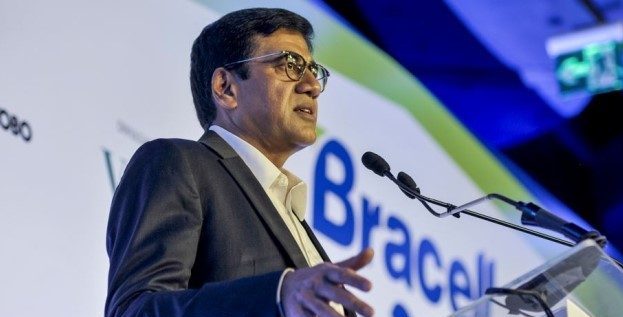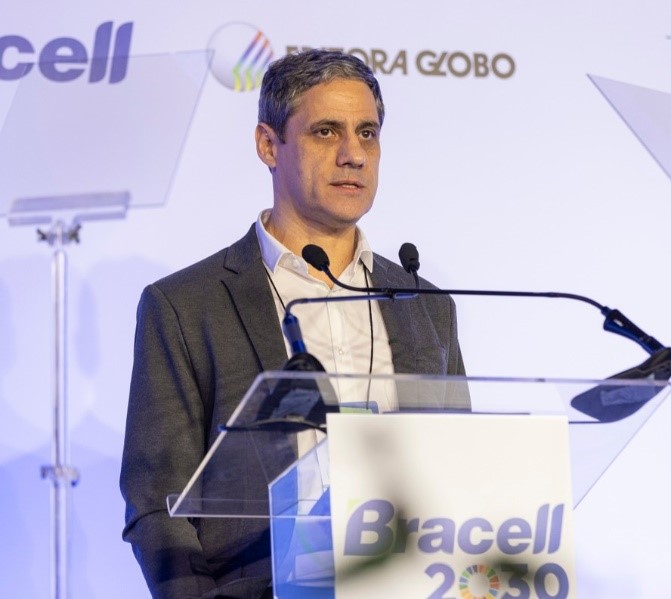Sukanto Tanoto
Sukanto Tanoto is the Founder and Chairman of Royal Golden Eagle (RGE), which manages a group of world-class companies specialising in resource-based manufacturing and is supported by a workforce of...

Latest updates on what's happening in RGE Group

This article is an adaptation of “Meeting brings together public and private sectors to talk about the ESG agenda,” published in Valor Economico. Changes include rewriting some of the passages and adding original materials.
Bringing together representatives from both the public and private sectors, Bracell hosted an event in São Paulo recently, to engage in a comprehensive discussion on the ESG (Environmental, Social, and Governance) agenda. The event underscore the synergy between business and sustainability, emphasising the need for collaboration between public and private entities. Praveen Singhavi, the president of Bracell, underlined the company’s commitment to responsible and sustainable growth in Brazil, highlighting significant investments in the country.
In the current year, Bracell initiated the construction of its newest Tissue unit in Brazil, situated in Lençóis Paulista (SP), alongside the existing pulp mill. This facility will be dedicated to producing toilet paper and paper towels for both domestic and international markets. The combined investments in these two mills exceeded R$ 20 billion in the state of São Paulo over the past four years, marking the largest private investment in the region in the last two decades. Praveen emphasised the company’s commitment to contributing to income generation and the creation of new business opportunities.
Underlining Bracell’s dedication to the preservation of native forests and biodiversity, Praveen highlighted the One-For-One commitment. This initiative entails Bracell pledging to conserve a hectare of native vegetation for every hectare of eucalyptus planted. In collaboration with the São Paulo State Government, this partnership has already played a crucial role in preserving over one hundred thousand hectares of public conservation units.
Praveen stressed the importance of collaborative efforts between the public and private sectors, advocating for practices that contribute to shared goals. Natália Resende, São Paulo State Secretary of Environment, Infrastructure, and Logistics, echoed this sentiment, emphasising the need for more companies to adopt a similar perspective and actively engage in the development of a circular economy.
Bracell2030
To discuss the rejuvenation of the company’s sustainability strategy and its priorities for the upcoming years, Márcio Nappo, Vice President of Sustainability and Corporate Communication, unveiled Bracell 2030. “We thought of end-to-end sustainability, encompassing all the stages of our chain of value. Our vision comes from the philosophy that everything we do needs to be good for the community, country, climate and customer, only then is good for the company”, he said. He proceeded to present ambitious goals aligned with the UN Sustainable Development Goals, outlining the actions already underway.

Márcio Nappo, VP of Sustainability and Corporate Communications at Bracell, unveils the Bracell 2030 commitment at Bracell’s stakeholder conference
Márcio Nappo highlighted these initiatives with the introduction of the company’s new electric truck. It is part of Bracell’s ground-breaking project in Brazil.
As part of the event, eucalyptus and golden trumpet tree seedlings were distributed during the event, offering participants an opportunity to bring home a piece of the One-For-One commitment.
Experts discuss how pulp companies can advance on the sustainable agenda
During a panel discussion, experts deliberated on how pulp companies can progress in their pursuit of a sustainable agenda. A pivotal segment of the Bracell 2030 strategy launch event, the panel, moderated by journalist Christiane Pelajo, featured insights from Paulo Hartung, an economist and former governor of Espírito Santo, who currently serves as the executive president of the Brazilian trees industry (Ibá); Mauricio Voivodic, President of WWF-Brazil; Liv Costa, Corporate Management Director of the São Paulo State Environmental Company (Cetesb); and Luiz Dutra, VP of Bracell Corporate Affairs.

Speaking on a panel at the Bracell stakeholder conference are Christiane Pelajo; Mauricio Voivodic; Paulo Hartung; Liv Costa and Luiz Dutra (left-to-right)
Pelajo initiated a conversation on the impact of plantations on water resources in Brazil. Dutra refuted the negative impact of plantation on water resources, asserting that comprehensive soil analysis from a water perspective needed for any forestry development. He underscored Bracell’s commitment to a philosophy that harmonises business strategy with sustainability, creating value at every stage of the chain.
Hartung emphasized the sector’s influence on the macro-economy, projecting that the productive chain of cultivated forests to surpass R$60 billion by 2028. The economist also highlighted the sector’s reliance on clean energy, constituting 86% of its industrial complex.
Voivodic commented that the sector could serve as an exemplar, inspiring others to embrace the low-carbon economy and biodiversity protection. The WWF-Brazil president underscored the planted forest sector’s responsibility for water management to safeguard basins and emphasised its pivotal role in environmental preservation. “This is probably the sector that is contributing most to meeting the forest restoration target of the Brazilian NDC. It is way ahead and still has a huge contribution to make,” he said.
Liv Costa, Cetesb’s Director of Corporate Management, emphasised the sector’s role in generating direct and indirect jobs, producing raw materials, and fostering potential developments in other industries.
All experts concurred on the collective nature of sustainability, stressing the imperative to unite forces for a positive legacy. Dutra highlighted the holistic approach taken by the experts, directing discussions with various stakeholders, including customers, suppliers, the community, public authorities, and other links, to ensure positive outcomes.
Energy transition
Liv Costa noted, “São Paulo begins with a favourable position, boasting a renewable energy share of 58.8%, surpassing the national average. Additionally, investments exceeding R$16.8 billion compatible with the energy transition have already been identified.” Costa also highlighted the potential of hydrogen supply for an upcoming market with significant prospects. Regarding advancements in discussions about the regulated carbon market in Brazil, Voivodic expressed confidence in the current version of the bill in the Chamber. He acknowledged the project’s robust regulatory structure while lamenting the exclusion of the agricultural sector. Nevertheless, Voivodic believes it will play a pivotal role in shaping Brazil’s low-carbon economy.
Concluding the discussion, Hartung underscored Brazil’s distinctive energy matrix, emphasising the country’s expertise in biomass utilisation, where the forest-based sector plays a central role. He also highlighted the nation’s potential to emerge as a provider of new clean energy, thanks to favourable climate conditions.